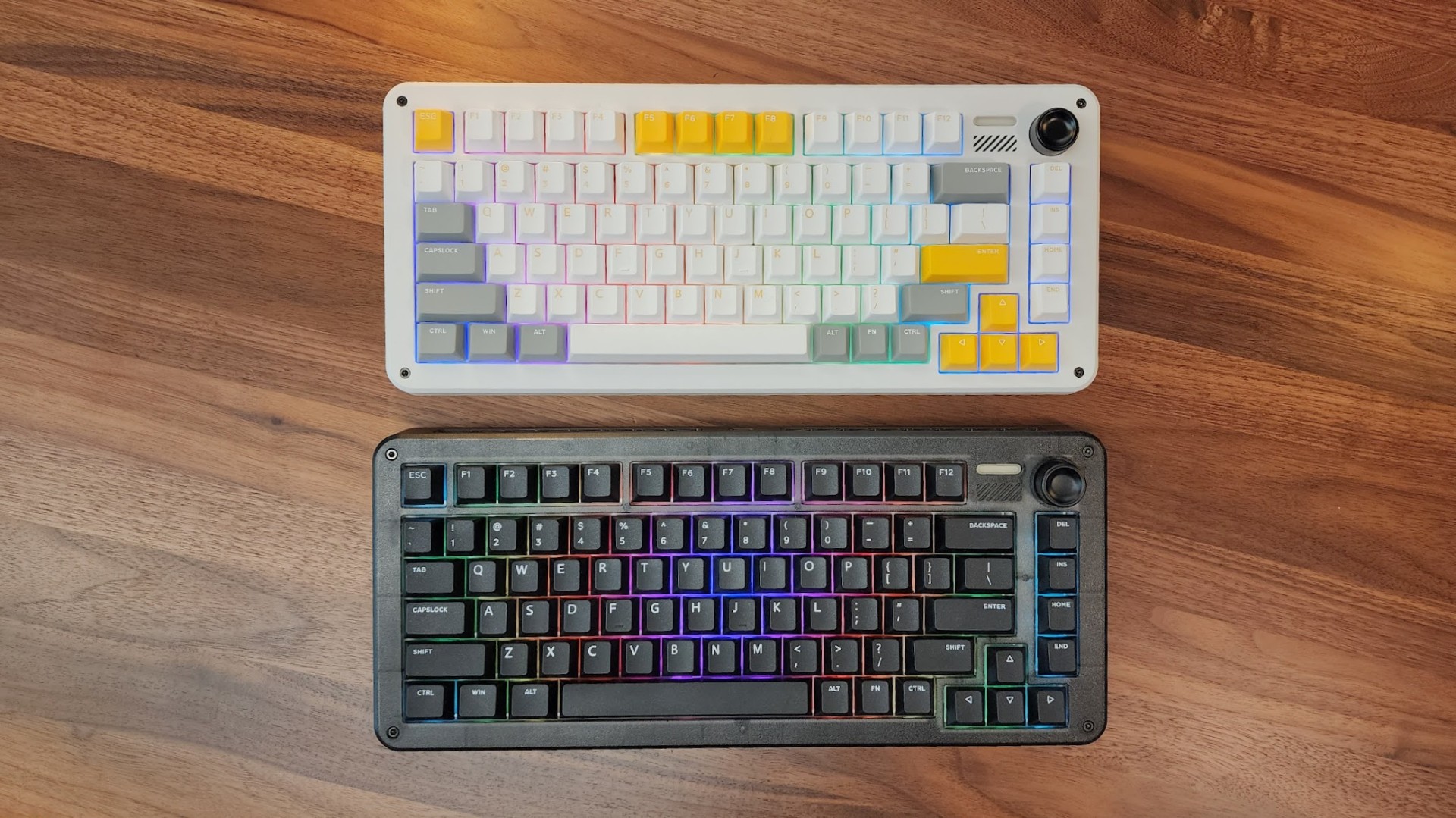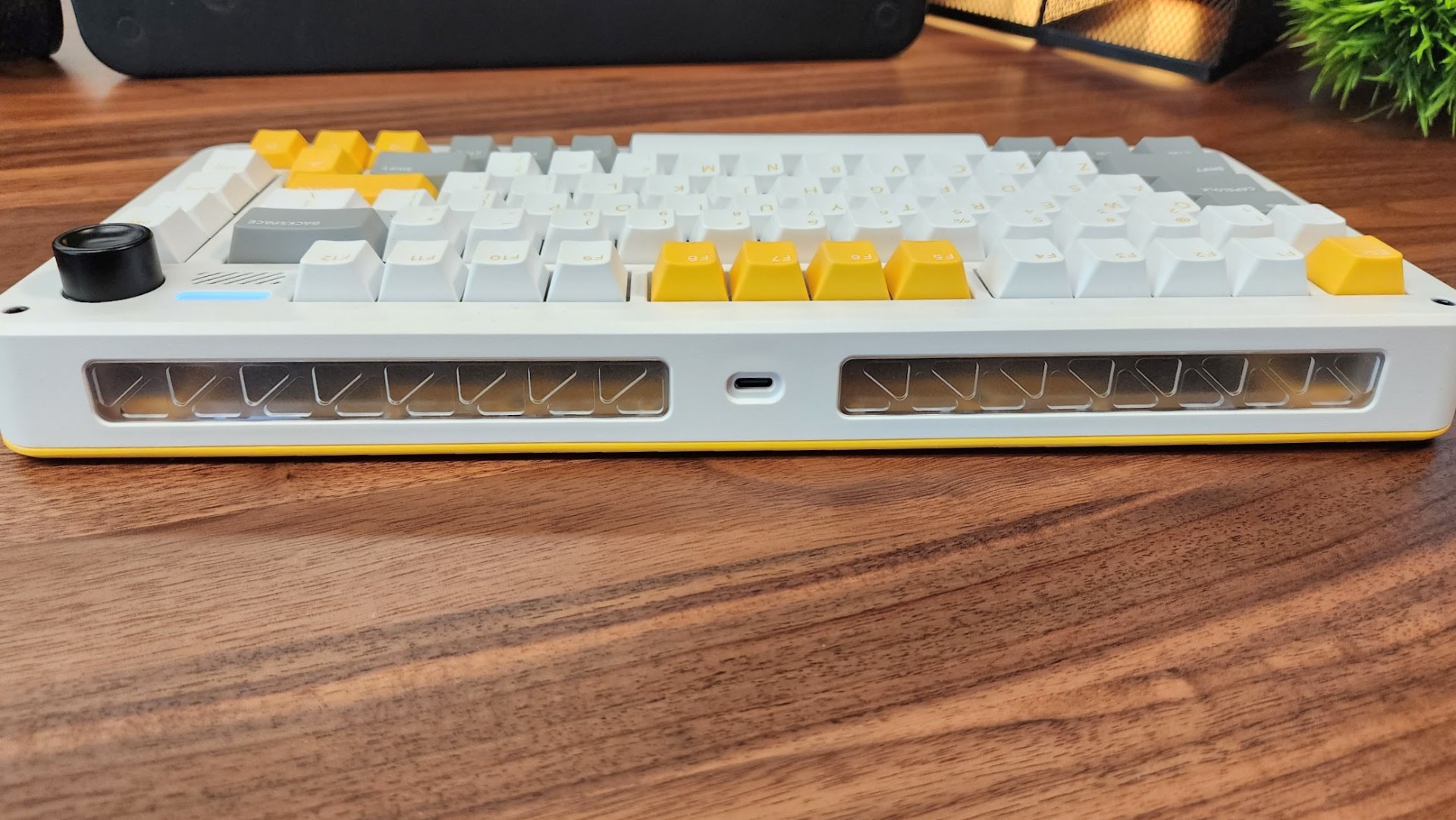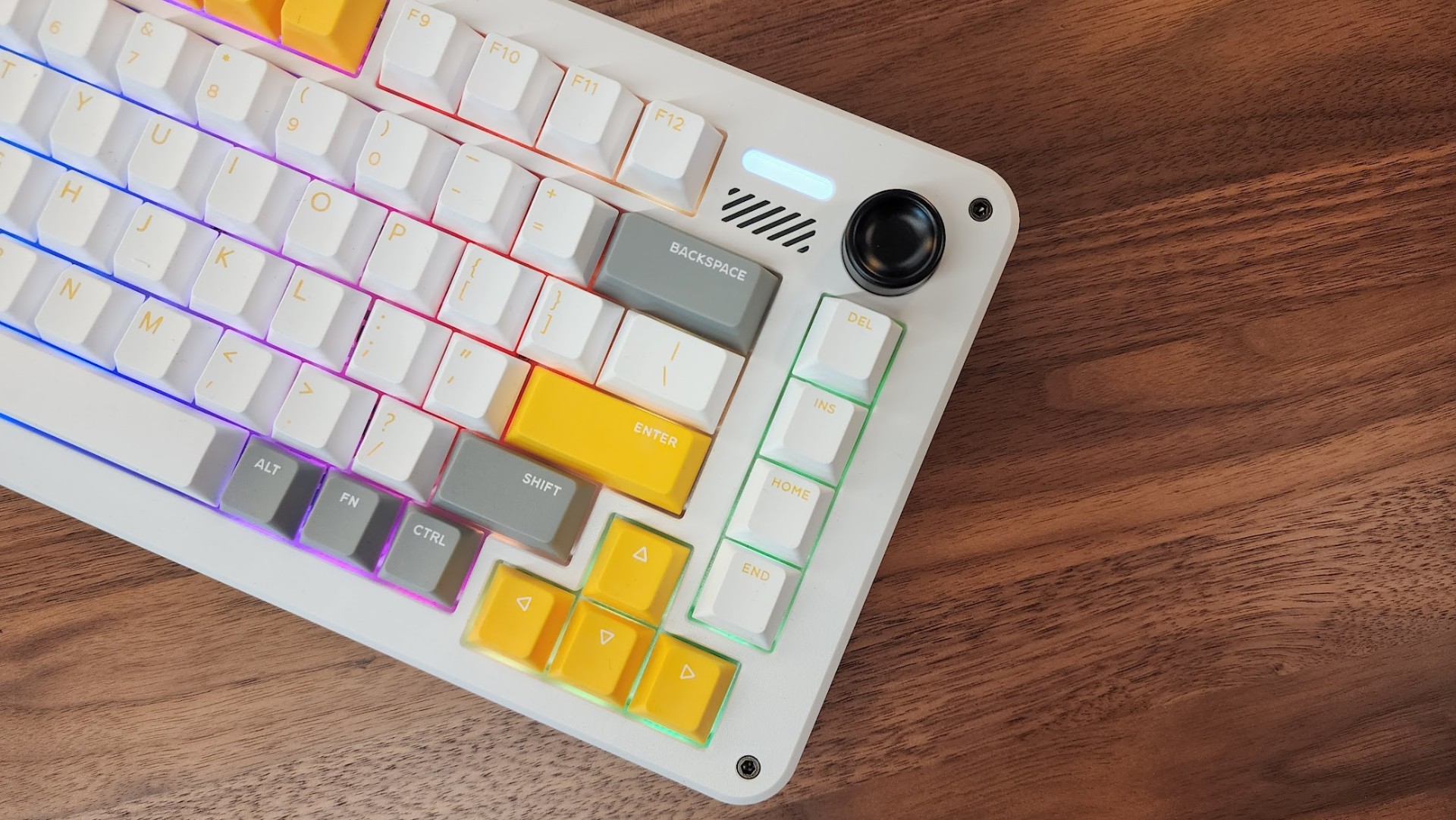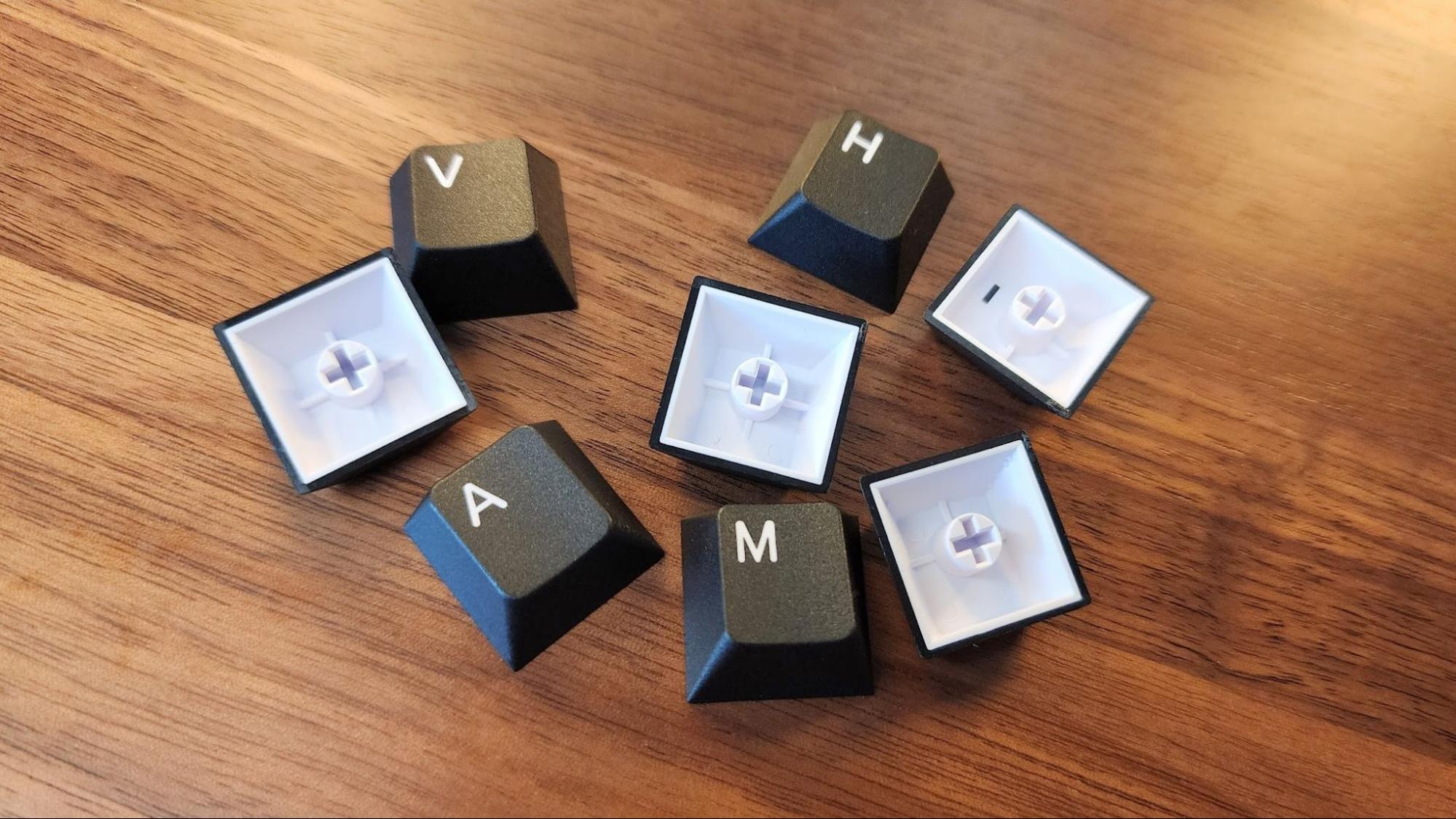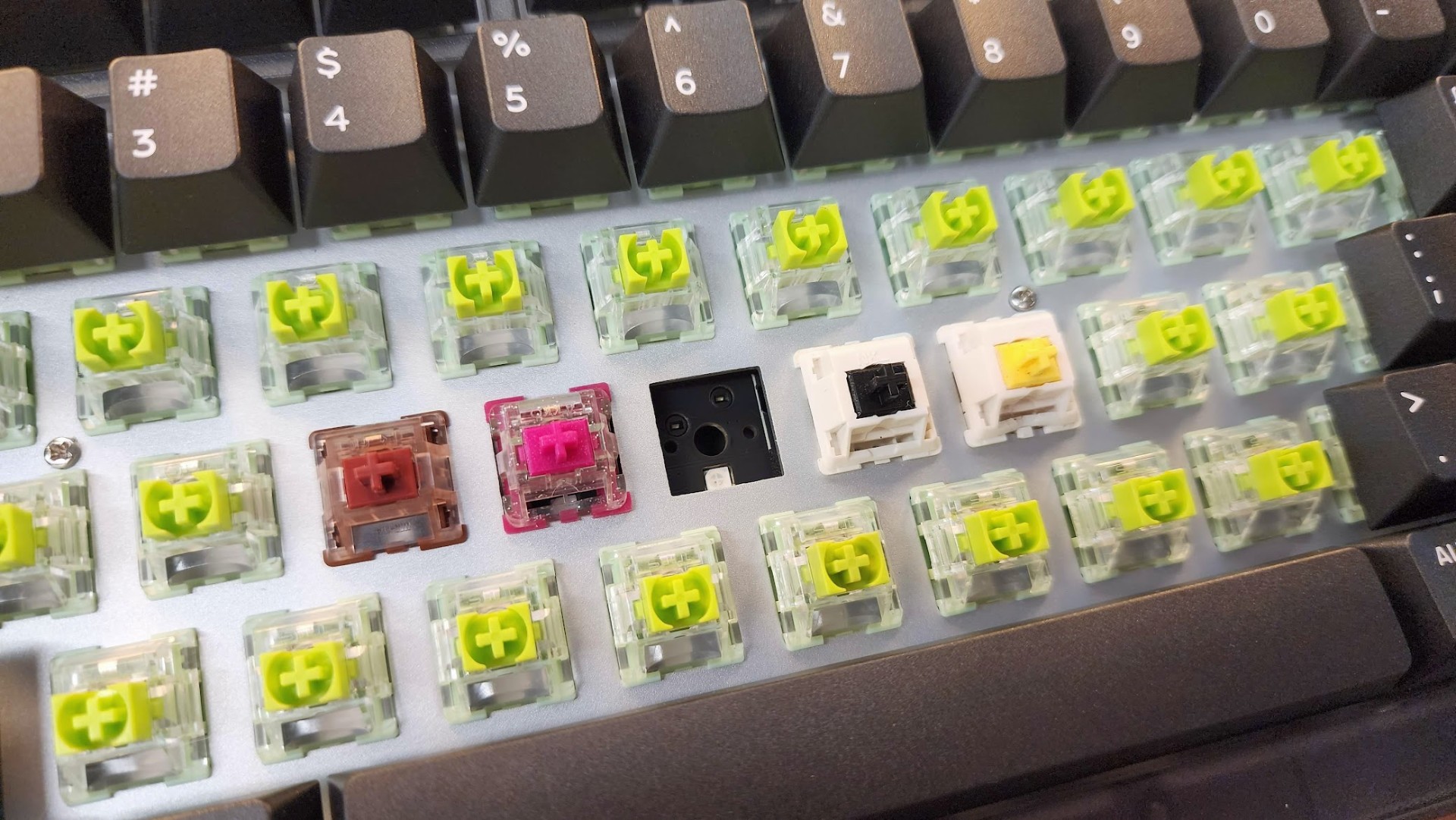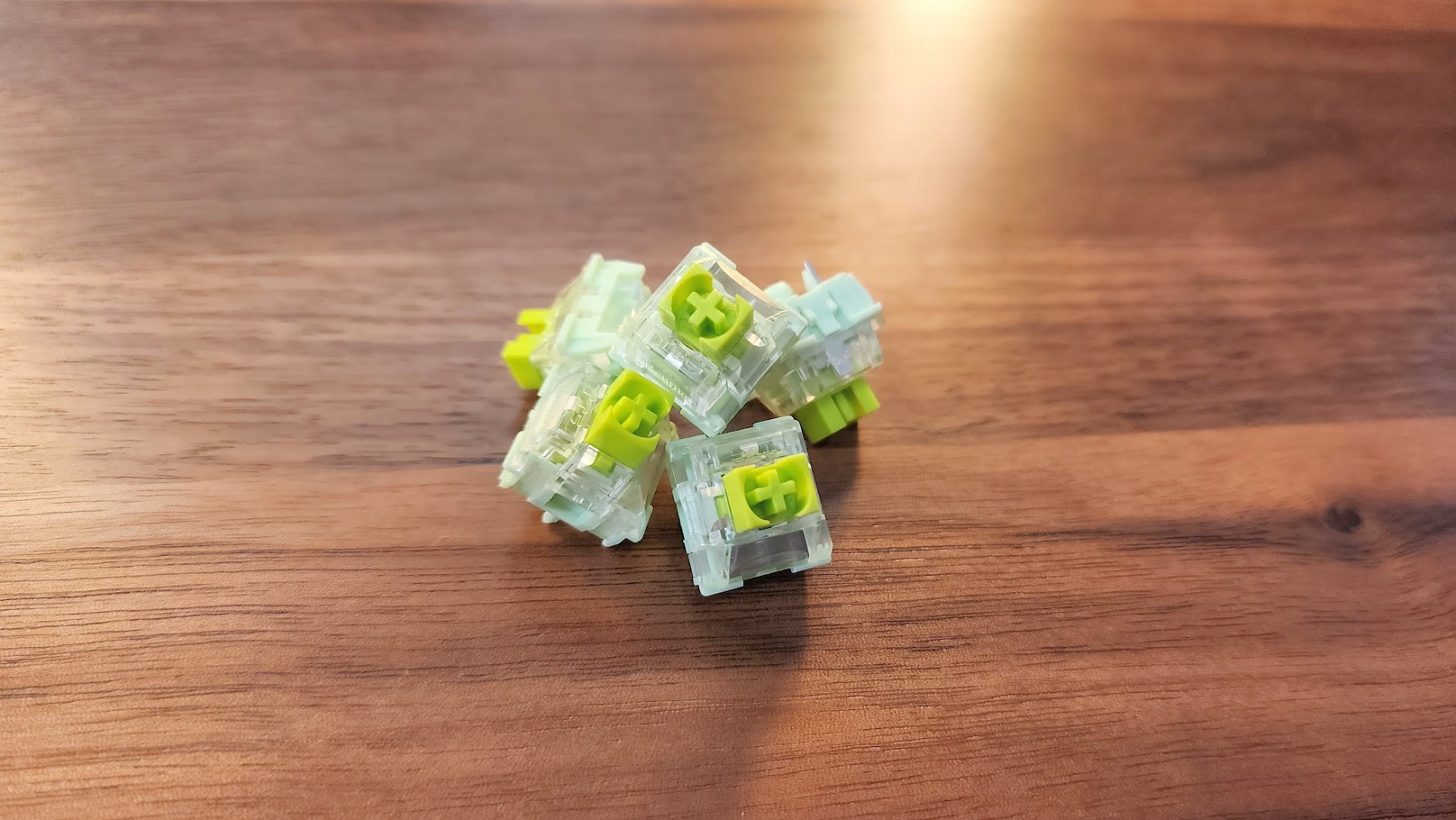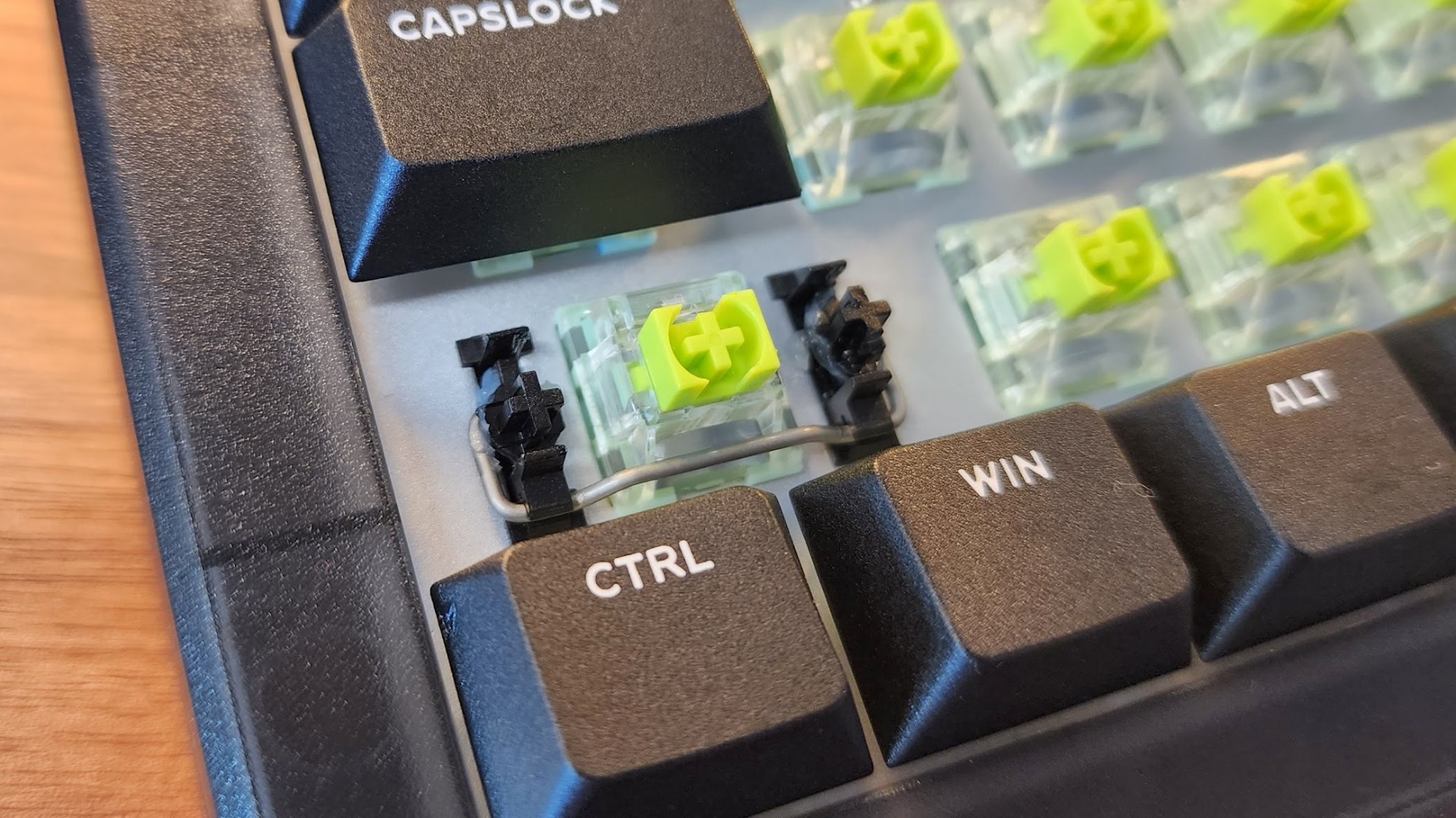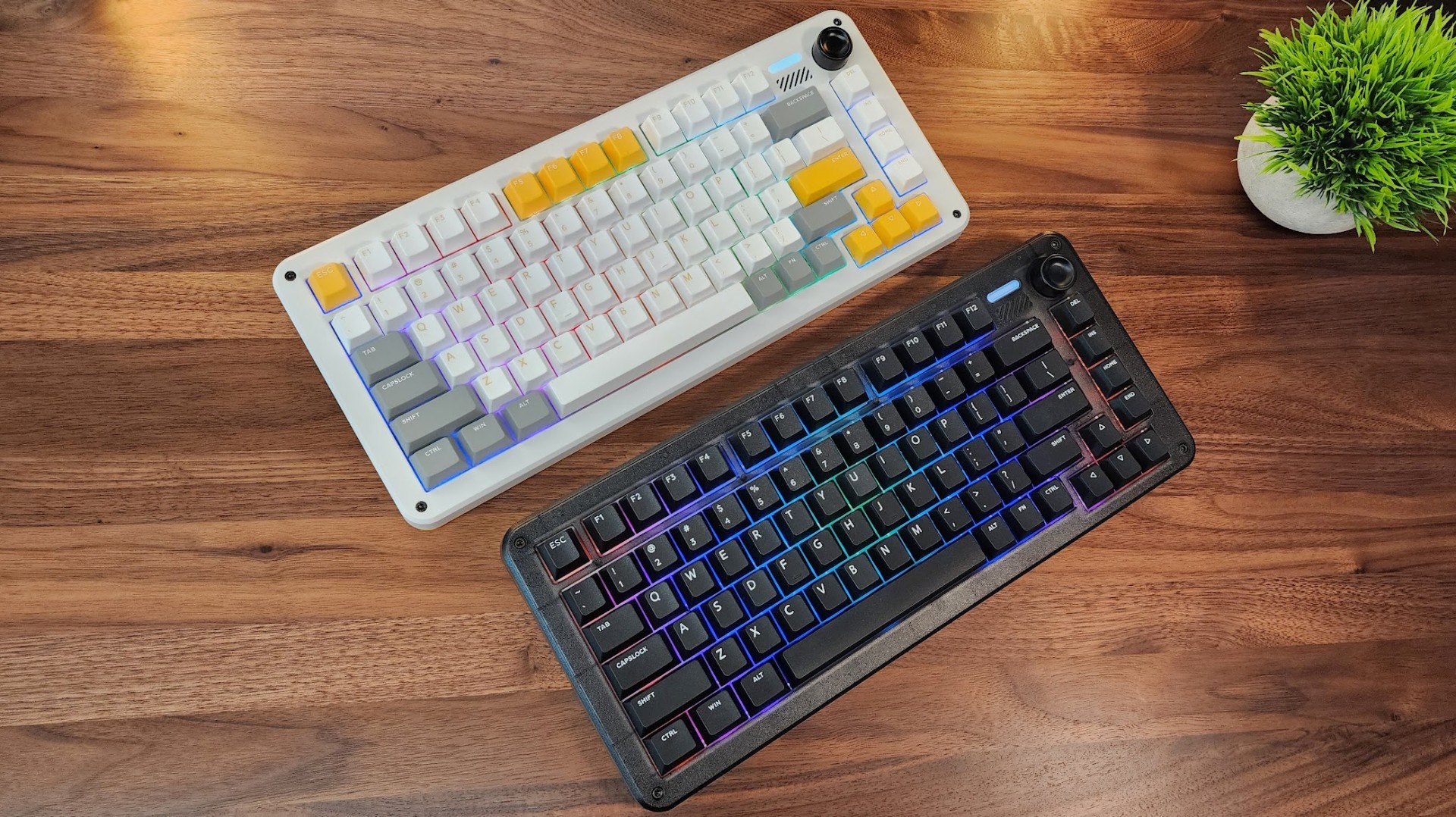Tom's Hardware Verdict
The iQunix ZX75 is a very good keyboard that delivers a unique look and great design for the money. Software to replace its missing keys is absent, but if you can get by without Page Up / Down, it’s another solid entry from iQunix.
Pros
- +
Unique, futuristic design
- +
Good typing experience
- +
Solid construction
- +
Great keycaps
- +
Reliable Bluetooth and 2.4GHz wireless
Cons
- -
Missing keys
- -
No software
- -
Not reprogrammable
Why you can trust Tom's Hardware
Love it or hate it, the mechanical keyboard hobby has a lot to do with looks. Once you move beyond the world of “gunmetal gray” of the best gaming keyboards, keycap colors and case designs become much more important. Not convinced? Take a peek at the mechanical keyboards subreddit. You might mistake it for a photography subreddit, but no: people just love interesting looking keyboards.
That’s exactly where the iQunix ZX75 comes in. It’s a mechanical keyboard designed to catch eyes and impress with retro-futuristic chic. But the looks are just a teaser to get you in the door. Once you take a closer peek, you find that it’s built to an enthusiast’s standard to deliver an excellent typing experience. Starting at $195, it’s premium priced, and does have a couple of notable drawbacks to be aware of, but for pure typing it’s a solid option that manages to impress.
iQunix ZX75 Specs
| Switches | Hot-swappable, Cherry MX Red, Brown, Blue, or Pink; TTC Gold Pink, Speed Silver, ACE |
| Layout | 75-percent |
| Lighting | Per-key RGB |
| Onboard Storage | None |
| Media Keys | Secondary keybinds |
| Connectivity | Detachable USB-C Cable, 2.4GHz wireless, Bluetooth 5.1 |
| Battery Life | Up to 300 days with backlight off |
| Additional Ports | None |
| Keycaps | Dye-sublimated PBT plastic |
| Construction | ABS frame |
| Software | None |
| Dimensions (LxWxH) | 13.6 x 5.9 x 1.7 inches |
Design of the iQunix ZX75
The iQunix ZX75 is the reminds me of the kind of keyboard you’d find on desk in Fallout; a blast from the past that somehow manages to look futuristic at the same time.l. It’s a board that lives and dies, in large part, on its aesthetic. It has a look that is as futuristic as it is retro. Its thick bezels and tall frame call out from a time when being thin and light wasn’t even a consideration. But its bright colors, latticework striping on the rear, and interesting mish-mash of textures and sylizations come together to create a keyboard that would feel at home on the deck of a space cruiser.
It comes in five different colorways, each with its own unique appeal. I was sent two versions to test out: Gravity Wave, which is white, gray, and yellow, and Dark Side which is black with a semi-translucent case. There’s also a black and orange Tangerine colorway, a green and white Camping version, and a second Dark Side that uses translucent keycaps.
From the top down, half-inch bezels on every side lend the keyboard a boxy look. There are hex screws in all four corners for a touch of industrial and a big lamp between the function row and volume knob that changes color to show Caps Lock and wireless pairing status. There’s a tall, smooth volume knob above the right corner that can be clicked to pause your music.
The design continues to be interesting around the rear and bottom of the keyboard. The back edge is built with a pair of frosted panels that almost look like windows. Flipping it over, the Gravity Wave version has a solid yellow back with diagonal stripes and a graph paper-like grid for the label. The Dark Side version has the same texture but is black all around and more minimalist overall. There are also a pair of magnetic tilt feet that can be flipped around to increase the typing angle and a switch to swap between wired and 2.4GHz wireless modes.
The design is unique, that’s for sure, but while the aesthetic may be the thing that ultimately sells you on the keyboard (or not), it has a lot more going on than just style. iQunix is known for making high-quality mechanical keyboards that are full of novel features and unique quirks that make them stand out from the pack. That continues to be the case here.
Get Tom's Hardware's best news and in-depth reviews, straight to your inbox.
The ZX75 uses a compact 75-percent layout. It keeps the function row and arrow keys, as well as a column of navigation and editing buttons along the right side. This column and the arrows beneath it are shifted closer to the main keyset to save space. Any superfluous keys — in the opinion of the designers — are removed.
The nav column is made up of four buttons: Delete, Insert, Home, and End. This is a departure from the A80 we reviewed last summer which used Page Up, Page Down, Home, and End. There are no keys for Print Screen or paging up and down on the ZX75, and unlike the majority of compact keyboards, these buttons aren’t mapped to a Fn combination. They’re just not there.
Depending on how often you use those keys, that may not be a big issue, but it was a regular pain point for me. As a writer, I use those keys often and not having them forced me to look for workarounds like using the Windows Snipping tool to take a simple screenshot (see how to take screenshots in Windows 10 or 11). There’s no software currently available to add these functions either. The support page says to “stay tuned” for a driver release but it’s not clear when that might actually happen.
It’s not an exaggeration to say that the keycaps are one of the biggest reasons to buy the ZX75. The color matching makes them immediately stand out on any desk, but they’re also extremely well-made. The keycaps are made of thick PBT plastic that doesn’t absorb oils from your skin or shine with extended use. The legends are made of a second piece of bonded plastic and so won’t chip or fade. And since they’re doubleshot, there isn’t any fuzziness on the edge of the legends; they’re crisp and clear.
Beneath those keycaps, the ZX75 comes with your choice of Cherry MX Blue, Red, or Brown switches, or TTC ACE, Gold Pink, or Speed Silver. The keyboard also supports hot-swapping switches, so if you have another set you would like to try, you can simply unplug the existing switch and plug in a new one.
It’s a solid enthusiast-level feature – but isn’t the only one. If you unplug one of those switches, you’ll notice that the LEDs are positioned at the bottom of the switch instead of the top. This south-facing orientation means that you can swap out keycaps for an aftermarket set without worrying about interference impacting its sound.
The keyboard also comes with pre-lubed costar stabilizer and has a layer of thick foam between the switches and the PCB. Typing is rattle-free and damped enough to remove any hollowness from the sound. Acoustics matter to keyboard enthusiasts, and this keyboard delivers a satisfying sound without the need for any modding.
The ZX75 can also be used wirelessly with Bluetooth 5.1 or 2.4GHz using the included dongle. The keyboard can save up to three Bluetooth connections and then swap between them on the fly using an Fn shortcut. Switching is reliable and fast, but if you’re gaming, you’ll want to stick to the 2.4GHz dongle for its faster 1,000 Hz polling rate.
If you’re a fan of RGB backlighting — or not — you’ll be pleased to know that iQunix offers the keyboard with and without lighting. Backlighting adds $20 to the sticker price, taking the total from $195 to $215, but it’s bright and vibrant, with 19 preset effects and ten static colors to choose from. Just don’t count on using it to type in the dark if you don't know your key placement, because the legends are not backlit. This is underglow only.
Typing Experience on the iQunix ZX75
The typing experience on any mechanical keyboard vary depending on the switches you choose. The ZX75 comes with your choice of Cherry MX or lesser-known TTC switches. Don’t let the unknown name dissuade you: the TTC switches are excellent. Both of the models I tested included TTC ACE switches, which are pre-lubed, super smooth linears, and sound great out of the box. I would choose these over Cherry switches any day of the week due to their improved smoothness and lack of spring noise.
The feel of typing on the ZX75 is very good. The switches are smooth and crisp with clacky bottom-outs. I also really love the feel of its keycaps. They’re slightly textured and feel nice under the fingers. Their doubleshot construction also lends them a bit of extra thickness that makes each keystroke sound and feel substantial.
The keyboard uses costar stabilizers that were completely rattle-free out of the box. I wouldn’t advise taking them apart unless you’re familiar with assembling keyboards, but I did and confirmed that they’re well-lubed straight out of the box. iQunix has done a masterful job of making sure you won’t have to disassemble these any time soon. They’re some of the best-tuned stabilizers I’ve used on a premade keyboard.
The ZX75 bucks the trend of soft and flexy typing experiences that’s taking over the enthusiast keyboard world. It goes old school with a very firm typing experience. It’s honestly a bit refreshing to have such a solid typing experience, but also helps make sure that the feel of every key is consistent with the next. If you’re looking for something soft and bouncy, this isn’t the keyboard for you.
The only real issues I had typing on the board had to do with the missing keys. Since the secondary layer is reserved exclusively for media, lighting, and wireless controls, I found myself having to look into workarounds like holding Ctrl while scrolling the mouse to simulate Page Up and Page Down. It’s annoying when there are so many unmapped keys. Surely, those missing buttons could have been mapped somewhere.
Gaming Experience on the iQunix ZX75
The ZX75 isn’t a gaming keyboard, but it works well for games that don’t require additional functions or keybinds. Much of the pleasure of using the keyboard is shared across purposes: the feel of the keys, the sound of typing, and the clean, crisp feedback when bottoming out. The keyboard is responsive enough for competitive gaming when playing wired or with the 2.4GHz dongle, so I never felt disadvantaged compared to a dedicated gaming keyboard. Bluetooth is best left for typing, however, as it only has a 125Hz (8ms) polling rate.
Beyond these basics, you may find yourself longing for something with a bit more flexibility. The ZX75 supports N-key rollover, so you won’t have to worry about missed keystrokes, but without the ability to reprogram keys or record macros, you’re locked to the base layer and whatever macro tools your game provides. Third-party tools like AutoHotKey come in clutch here but first need to be learned and then left running in the background. This should change in time as iQunix releases custom software for the keyboard, but it’s not available as of this writing.
Bottom Line
The ZX75 is a very good keyboard that delivers enthusiast-level features in a unique and eye-catching package. The typing experience is top-notch for a pre-built keyboard and the keycaps could easily sell on their own for a premium.
With that in mind, the ZX75 is a keyboard that needs software to replace its missing keys and currently lacks it. The iQunix A80 Explorer offers a similar layout and features and has a readily available driver, so is a solid alternative if you need remapping features. If you like the unique look but need a number pad, the iQunix F97 is the next best thing and is well worth considering.
At the end of the day, if you don’t need its missing Print Screen and Page Up / Down keys, the ZX75 remains a solid pick. It offers a great typing feel and sound, better looks, and is the rare keyboard that lets you save money if you opt-out of RGB.
MORE: Best Gaming Keyboards
MORE: How to Pick Keycaps for Your Mechanical Keyboard
MORE: All Motherboard Content

Chris is a regular contributor for Tom’s Hardware, covering mechanical keyboards, peripherals, and content creation gear.
-
Belardo Seems idiotic to release a product without software to configure the keys. There are programs out there that will remap the keys within windows, but that's not the keyboard. That works, mostly... as some brands include software for RGB control, but not key-mapping.Reply
Still would have been better to use that LED spot for a DELETE key. Then the other four along the side could have been HOME, END, PGUp and PGDown. Who really uses the INSert key? I know how it works, its far more PITA than useful... and easy enough to make it a SHIFT-DEL if someone really wants that.
A problem with most Keyboard companies is the software. Pay 1-2 guys to make the software solid and powerful can go a long way to making a product great or garbage. Worse, when some companies include viruses in their software.
For Keyboard reviews, you need to have a standard SPEC stat which would help keyboard readers to see what the product offers.
RGB: North or South.
That alone can make or lose a sale.
SOUTH = Most choice of keycaps, best options and best looks. But in dark or low-light environments, it makes the legends harder to read when there is light around the key. Of course, without lighting, they look great.
NORTH = If you want your legends to light up.
Also, the difference between a black and white backplate is noticeable. WHITE = more reflective light around the keycaps. I prefer back, as it makes they glow of the legends stick out more... making the keys look more like they are floating with an LED inside. -
gamebynight Hi everyone! I wrote this review and wanted to update everyone that iQunix has made software available, addressing one of my concerns here. You can access it at: https://iqunix.store/pages/product-supportReply
Thank you for reading!
